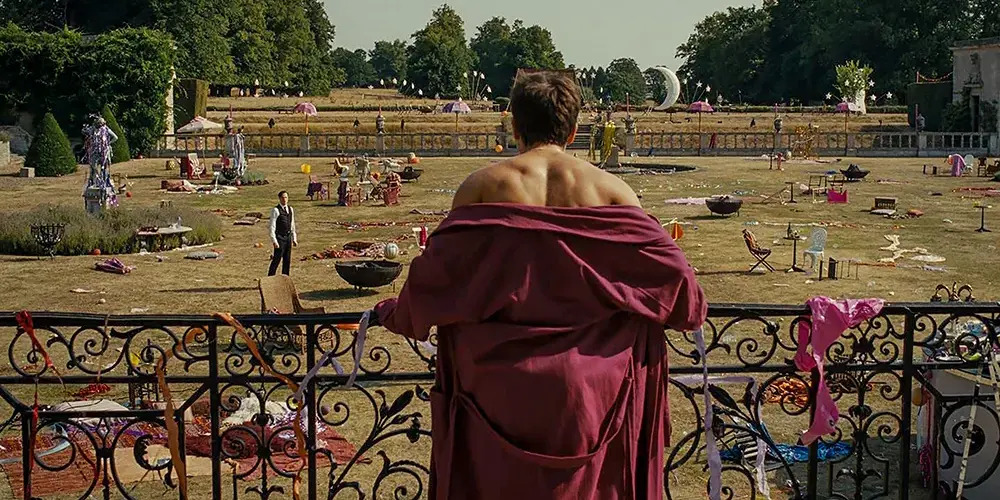‘Saltburn’ is a black comedy psychological thriller film directed by Emerald Fennell. It revolves around Oliver Quick, a young student at Oxford University, who accepts an offer to spend time with his wealthy schoolmate, Felix Catton, and his family, at the estate. In time, Oliver and Felix become attracted and obsessed with each other. However, the seemingly complex romance turns dark when the duo’s true desires contrast with their infatuation. Furthermore, the movie tackles the subject of social classes, reminding viewers of some classic novels. As a result, viewers must be wondering whether ‘Saltburn’ is based on a true story or a book.
The Inspiration Behind Saltburn
‘Saltburn’ is not based on a true story. The film is based on an original concept from writer-director Emerald Fennell, best known for her work on the 2020 film ‘Promising Young Woman.’ The film tells the story of Oliver Quick, a young university student who inadvertently becomes attracted to Felix Catton, a wealthy schoolmate. In an interview with Another Magazine, Fennell explained that she was inspired by Gothic books and wanted to create a film in the country-house subgenre with a British setting and Gothic feel.

“The British, gothic, country-house film is such an established genre. Saltburn needed to have the same story beats and visual language. Then it’s not quite so familiar the further you go in,” Fennell stated. Fennell has said that books such as ‘The Go-Between’ by L. P. Hartley, ‘Atonement’ by Ian McEwan, and ‘Brideshead Revisited’ by Evelyn Waugh are comparable to her work on ‘Saltburn.’ She also cited author Patricia Highsmith’s books as a major influence.
However, the story is not directly based on or adapted from a singular book. Instead, Fennell devised the film’s story from her desire to explore the darkness of human desire and obsession. While speaking to Letterboxd, Fennell explained how she approached the movie’s Gothic romance story. “When you’re talking about desire, when you’re talking about real obsession, it is dark. That’s why this film is a Gothic romance. It’s a horror, where those two things are rubbing up against each other, the thing that makes you feel good and the thing that makes you feel bad,” the writer-director said in the interview.
The film is primarily set in Oxford, United Kingdom, and Fennell herself graduated from Oxford University. She drew inspiration from some of her experiences at the college but admitted that the film’s story is less about her time at Oxford and more about the collective perception of desire. “Whether or not (Saltburn is) about my time at Oxford, it’s more about my obsession and all of our obsessions with looking at things we want. The constant watching and endless voyeurism, the bottomless pit of voracious need and desire for people and their houses and their families,” Fennell said.
The film’s central characters, Oliver and Felix, embody the primary theme as their obsession with each other is abbreviated by voyeurism. Moreover, the two characters come from different social backgrounds, with Felix being an upper-class, wealthy socialite. Fennell explained that she wanted to explore the absurdity of the class system through the story. “Absurdity is a part of life. Therefore, any social construct we have – class being the foremost in our country – is completely absurd,” Fennell said during an interview with Another Magazine. “And, in general, I’m always going to be interested in sex and power at the center of everything. Those are the central tensions of all drama. Whether it’s the dynamics between men and women or between the class system – that’s going to be fascinating forever,” she added.
From Fennell’s words, it is safe to say that ‘Saltburn’ is not based on a true story. The film tells a fictional story that deals with the darker aspects of desire and obsession hiding inside every human. However, it takes a satirical take on the subject, infusing it with elements of timeless Gothic romance that will remind viewers of some classic novels. At its core, ‘Saltburn’ is a study of human behavior, particularly when it comes to the power dynamics created by constructs such as infatuation, love, and class systems.
Read More: Best Dark Comedy Movies of the 21st Century


You must be logged in to post a comment.